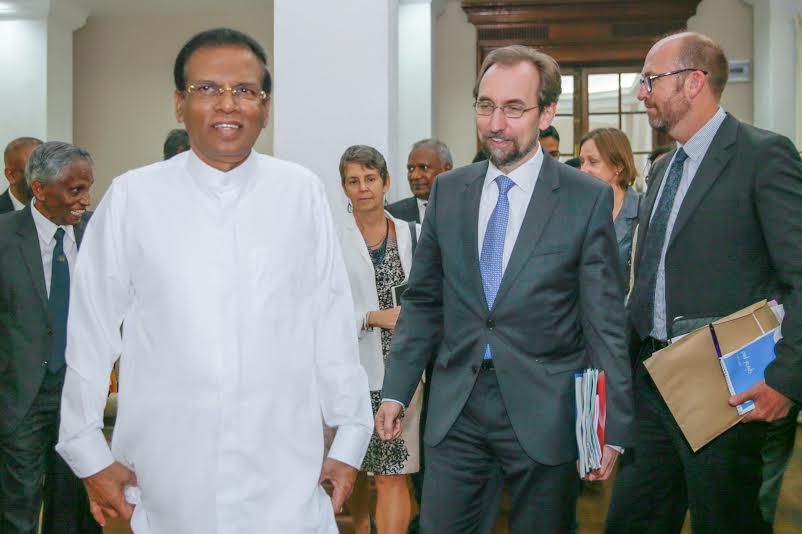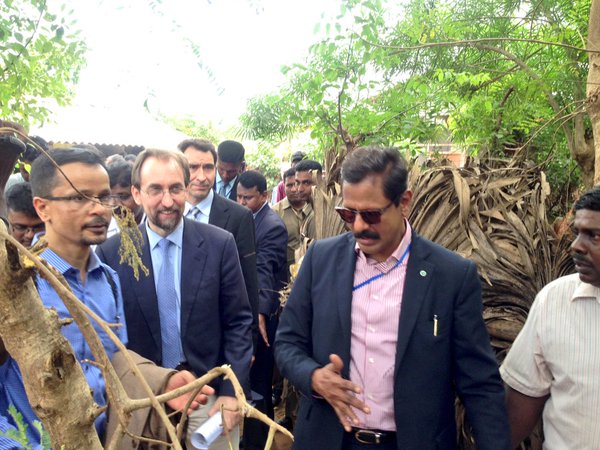 Chief Minister of the Northern Provincial Council C. V. Wigneswaran with United Nations Human Rights Commissioner Zeid Ra’ad Al Hussein in Jaffna. |
United Nations Human Rights Commissioner Zeid Ra’ad Al Hussein has concluded a four-day trip across the Tamil North-East where he met Tamil leaders, displaced persons and civil society representatives, as well as leaders from the Sri Lankan government.
As he finished his trip, the human rights chief highlighted the decades of "judicial failures" in Sri Lanka and stressed the importance of international partipation in an accountability mechanism for crimes committed during the armed conflict.
He also addressed the need for de-militarisation and the return of land from Sri Lankan occupation in the North-East stating the region suffered from "damaged and depressed areas, poverty and continued displacement".
See more in our post: UN Rights Chief stresses importance of international participation in accountability and de-militarisation (09 Feb 2016)
Prior to concluding his visit, Mr Hussein met with Sri Lankan government leaders, including hte president and prime minister, stating that he was "reassured.. to hear both the President and the Prime Minister state their firm conviction" in regards to the governments huamn rights commitments.
 |
See our post: Zeid meets with Sri Lanka’s leaders to reaffirm human rights commitments (09 Feb 2016)
Whilst in Colombo the human rights chief also met with leaders of the Tamil National Alliance, where discussions regarding problems faced by the Tamil people, including resettlement in their own lands, took place.
|
See our post: UN Human Rights chief discusses resettlement of Tamils with TNA (09 Feb 2016)
Mr Hussein began his trip in Jaffna, where he met with the Chief Minister of the Northern Provincial Council C. V. Wigneswaran, and discussed the issues of releasing Tamil political prisoners, finding the fate of missing persons and releasing land from Sri Lankan military occupation.
Justice Wigneswaran handed the High Commissioner a list of 4,000 people who have been listed as missing since the end of the armed conflict, alongside dates and places they were last seen.
The High Commissioner also met with Sri Lanka’s Governor of Northern Province. H. M. G. S. Palihakkara
 |
See our post: Human Rights Chief talks political prisoners, disappearances and release of land on North-East visit (07 Feb 2016)
Before entering the meeting, the UN human rights chief stopped to talk to protestors outside the office, who were calling on the UN to help find their missing relatives.
 |
See our post: UN High Commissioner meets protesting relatives of the disappeared in Jaffna (07 Feb 2016)
The High Commissioner also visited Chunnakam IDP camp on Saturday, stating that he hoped the displaced Tamil villagers would be returned to their original homes the next time he visited Jaffna.
"You must be tired when you see people like me year after year and you tell your stories and nothing seems to happen," he said. "But I assure you, I assure you, in the end there will be change and you will find your way home," he concluded to cheers and applause from the camp’s residents.
 |
See our post:Human Rights Chief raises hopes of resettlement at IDP camp in Jaffna (08 Feb 2016)
Mr Hussein also visited Trincomalee where he met with government officials and civil society activists who called on the United Nations to be actively involved in Sri Lanka’s justice process.
UN Human Rights chief visits Trincomalee (09 Feb 2016)
Meanwhile in Colombo, hundreds of Sinhala nationalists protested against Mr Al Hussein’s visit to the island, waving Sri Lankan flags, throwing shoes and slippers at photographs of the UN human rights chief, before burning posters with his image.
 Photograph: Daily Mirror |
See our post: Hundreds of Sinhala nationalists protest against UN human rights chief (07 Feb 2016)
Prior to his arrival on the island, the High Commissioner’s office said he would “discuss a range of current challenges and opportunities for strengthening the rule of law and protection of human rights in Sri Lanka, including reviewing the implementation of the recommendations made in his report to the Human Rights Council, and in its subsequent Resolution 30/1 on “promoting reconciliation, accountability and human rights in Sri Lanka”.
We need your support
Sri Lanka is one of the most dangerous places in the world to be a journalist. Tamil journalists are particularly at threat, with at least 41 media workers known to have been killed by the Sri Lankan state or its paramilitaries during and after the armed conflict.
Despite the risks, our team on the ground remain committed to providing detailed and accurate reporting of developments in the Tamil homeland, across the island and around the world, as well as providing expert analysis and insight from the Tamil point of view
We need your support in keeping our journalism going. Support our work today.
For more ways to donate visit https://donate.tamilguardian.com.

